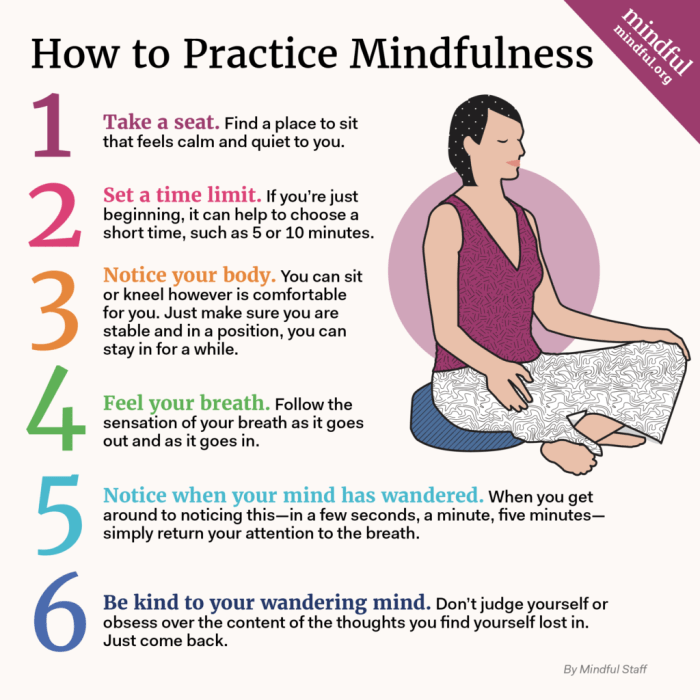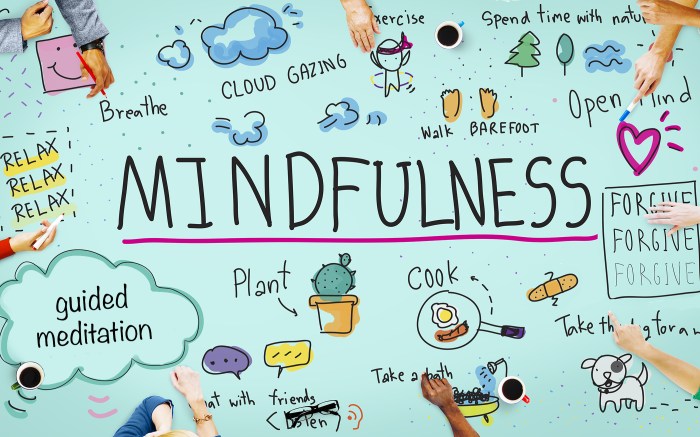Mindfulness practices are all about staying present and centered in the midst of our chaotic lives. From meditation to deep breathing, these techniques offer a path to inner peace and self-discovery. Let’s dive into the world of mindfulness and explore the transformative power it holds.
Introduction to Mindfulness Practices
Mindfulness practices involve being fully present and aware of the current moment without judgment. These practices have gained significance in everyday life as they help reduce stress, improve focus, and enhance overall well-being.
The origins of mindfulness practices can be traced back to ancient Buddhist traditions, where they were used for spiritual growth and enlightenment. Over time, these practices have been adapted and integrated into various secular contexts, making them accessible to people from all walks of life.
Popular Mindfulness Techniques
- Meditation: This practice involves focusing the mind on a particular object, thought, or activity to cultivate awareness and achieve mental clarity.
- Deep Breathing: By consciously regulating the breath, individuals can calm the mind, reduce anxiety, and promote relaxation.
- Body Scans: This technique involves systematically bringing attention to different parts of the body, helping individuals connect with physical sensations and release tension.
Benefits of Mindfulness Practices

Practicing mindfulness comes with a wide range of benefits that can positively impact both our physical and mental well-being.
Physical Benefits
- Reduces inflammation in the body, lowering the risk of chronic diseases.
- Improves sleep quality, leading to better overall health and energy levels.
- Enhances immune function, helping the body fight off illnesses more effectively.
Mental Health Advantages
- Reduces stress levels by promoting relaxation and calmness.
- Enhances focus and concentration, improving productivity and cognitive performance.
- Helps manage anxiety and depression symptoms by fostering a sense of peace and balance.
Emotional Well-being and Self-awareness
- Increases emotional intelligence, allowing for better self-regulation and understanding of others.
- Promotes self-awareness by encouraging introspection and reflection on thoughts and emotions.
- Enhances resilience, helping individuals cope with challenges and setbacks more effectively.
Different Approaches to Mindfulness
In the practice of mindfulness, there are various techniques that individuals can explore to cultivate awareness and presence in different aspects of their lives.
One of the most common mindfulness practices is mindfulness meditation, where individuals focus on their breath or a specific object to anchor their attention and observe their thoughts without judgment. This practice helps in developing self-awareness, reducing stress, and enhancing overall well-being.
Another approach to mindfulness is mindful eating, which involves paying full attention to the sensory experience of eating, such as the taste, texture, and smell of food. By practicing mindful eating, individuals can develop a healthier relationship with food, improve digestion, and prevent overeating.
Mindful walking is also a popular mindfulness technique that involves walking slowly and attentively, focusing on each step and the sensations in the body. This practice can help individuals connect with the present moment, increase physical awareness, and promote relaxation.
Cultural and Traditional Differences in Mindfulness
Mindfulness practices can vary across different cultures and traditions, with each incorporating unique elements and approaches to cultivating mindfulness.
In Eastern cultures like Buddhism, mindfulness meditation is deeply rooted in spiritual traditions and is often practiced as a path to enlightenment and self-realization. The emphasis is placed on cultivating inner peace, compassion, and wisdom through meditation practices.
In Western cultures, mindfulness is often secularized and integrated into various therapeutic approaches like Mindfulness-Based Stress Reduction (MBSR) and Mindfulness-Based Cognitive Therapy (MBCT). These approaches focus on using mindfulness as a tool for managing stress, anxiety, and depression, without the religious or spiritual connotations.
Effectiveness of Mindfulness Approaches
Different mindfulness approaches can be effective in achieving specific goals based on the individual’s needs and preferences.
Mindfulness meditation has been shown to be effective in reducing symptoms of anxiety, depression, and chronic pain, as well as improving attention and emotional regulation. It is a versatile practice that can be tailored to different goals, such as enhancing focus, cultivating compassion, or promoting relaxation.
Mindful eating can help individuals develop a healthier relationship with food, improve digestion, and prevent emotional eating. By practicing mindful eating, individuals can become more attuned to their body’s hunger and fullness cues, leading to better eating habits and overall well-being.
Mindful walking can be beneficial for individuals who struggle with sitting meditation or prefer a more active form of mindfulness practice. It allows individuals to connect with nature, increase physical awareness, and promote relaxation through movement and breath awareness.
Incorporating Mindfulness into Daily Life

Integrating mindfulness practices into our daily routines can be a game-changer for our mental well-being. It’s all about finding ways to weave mindfulness into our busy schedules and creating a peaceful environment wherever we are.
Tips for Busy Schedules
- Start small: Even a few minutes of mindfulness meditation in the morning can set a positive tone for the day.
- Use reminders: Set alarms or notifications on your phone to prompt you to take mindful breaks throughout the day.
- Multitask mindfully: Practice mindfulness while doing everyday tasks like washing dishes or walking to the store.
Creating a Calming Environment
- Declutter your space: A tidy environment can help clear your mind and reduce distractions.
- Add greenery: Plants can have a calming effect and improve air quality in your home or workspace.
- Use soothing scents: Essential oils or candles with relaxing scents like lavender can enhance your mindfulness practice.
Importance of Consistency
Consistency is key when it comes to mindfulness. Establishing a routine helps make mindfulness a habit and allows you to reap the full benefits of the practice.
Remember, it’s not about being perfect, but about showing up for yourself each day with intention and awareness.
Mindfulness Practices for Specific Situations
In today’s fast-paced world, mindfulness practices are becoming increasingly important for managing stress, anxiety, improving productivity, enhancing creativity, and fostering better relationships and communication.
Exploring mindfulness exercises tailored for stress management and anxiety relief can significantly help individuals cope with the pressures of daily life. By focusing on the present moment and becoming more aware of thoughts and feelings, mindfulness techniques like deep breathing, body scans, and meditation can provide a sense of calm and relaxation.
Improving Productivity and Creativity
When it comes to boosting productivity and creativity, incorporating mindfulness practices into your daily routine can make a significant difference. By practicing mindfulness, individuals can enhance their focus, concentration, and problem-solving skills. Techniques like mindful breathing, mindful walking, and mindfulness-based stress reduction can help clear the mind and foster a more creative mindset.
Enhancing Relationships and Communication, Mindfulness practices
Mindfulness techniques are also beneficial for improving relationships and communication. By being fully present in interactions with others, individuals can cultivate empathy, active listening, and understanding. Mindful communication practices such as non-judgmental listening, speaking with intention, and expressing gratitude can help build stronger connections and resolve conflicts more effectively.